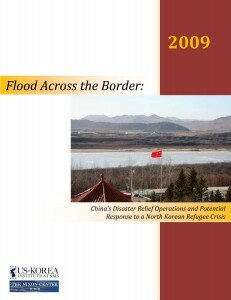 A U.S. policy based on containment and isolation alone only concedes that North Korea will remain nuclear-armed and that its weapons programs will further develop. That, in turn, will undermine stability in East Asia, sow doubts in Tokyo and Seoul about relying too much on the United States for their security and jeopardize cooperation with China. A nuclear North will also undermine Washington’s global disarmament and non-proliferation agenda, particularly when viewed in conjunction with the danger of a nuclear Iran. The threat may become even more direct to U.S. security if the North perfects a long-range missile delivery system or exports fissile material or nuclear technology.
A U.S. policy based on containment and isolation alone only concedes that North Korea will remain nuclear-armed and that its weapons programs will further develop. That, in turn, will undermine stability in East Asia, sow doubts in Tokyo and Seoul about relying too much on the United States for their security and jeopardize cooperation with China. A nuclear North will also undermine Washington’s global disarmament and non-proliferation agenda, particularly when viewed in conjunction with the danger of a nuclear Iran. The threat may become even more direct to U.S. security if the North perfects a long-range missile delivery system or exports fissile material or nuclear technology.
An effective American strategy towards North Korea will require a combination of tough measures with serious dialogue and engagement. “U.S. Strategy Towards North Korea: Rebuilding Dialogue and Engagement,” a new report by Joel S. Wit, discusses current developments in North Korea and, in that context, lays out a realistic set of U.S. objectives and recommendations for dealing with Pyongyang through dialogue and engagement. While that plan focuses on the United States, it should be noted that consultation and cooperation with key allies as well as with China, Russia and the international community will be central to its implementation.
This report is a joint U.S.-Korea Institute at SAIS and Weatherhead East Asian Institute at Columbia University publication.
Executive Summary: U.S. Strategy Towards North Korea, by Joel S. Wit (USKI: October 2009)
Full Report: “U.S. Strategy Towards North Korea: Rebuilding Dialogue and Engagement”, by Joel S. Wit (USKI: October 2009)
Supplemental Materials: Table 1, Table 2, Table 3
In writing this report, Joel Wit, the principal author, was assisted by a number of prominent experts who provided background papers for this study. These experts included: Bradley Babson, John Feffer, David Von Hippel, Peter Hayes, Karin Lee, Patrick Morgan, William Newcomb, Alan Romberg, Sharon Squassoni, Fred McGoldrick, Lee Sigal, and David Wright. Copies of their background papers can be accessed through the Nautilus Institute and the National Committee for North Korea.
Many thanks to the Ploughshares Fund for their support of this project.
Joel S. Wit is a visiting scholar at the U.S.-Korea Institute at the Paul H. Nitze School of Advanced International Studies (SAIS) at Johns Hopkins University and an adjunct senior research fellow at the Weatherhead East Asia Institute at Columbia University. Wit is a former State Department official who worked on U.S. policy towards North Korea from 1993 to 2002, first as a senior advisor to Ambassador Robert L. Gallucci and then as the coordinator for the implementation of the 1994 U.S.-North Korea Agreed Framework. After leaving the State Department, he was as visiting scholar at the Brookings Institution from 2000 to 2002 and subsequently senior fellow at the Center for Strategic and International Studies (CSIS) until 2005. Wit is the co-author of Going Critical: The First North Korean Nuclear Crisis.



